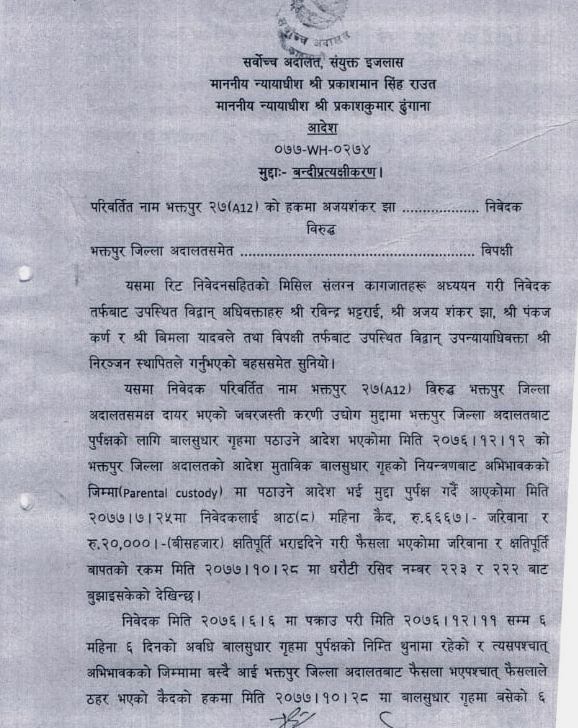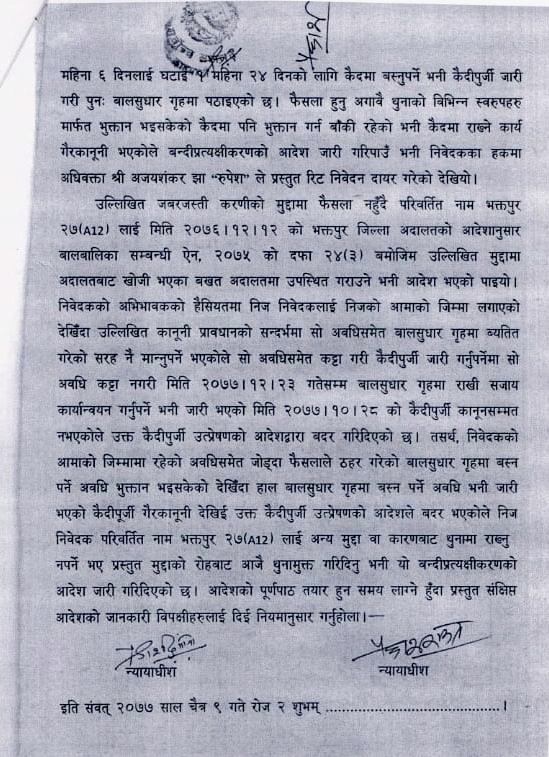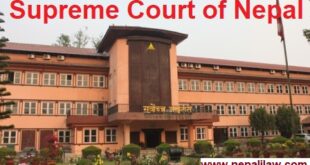The Supreme Court of Nepal made an important judgment for the best interest of child and juvenile justice on 22 March 2021.
The joint bench of the Supreme Court issued a writ of Habeas corpus, to send the juvenile from correction home to parental custody due to COVID-19.
The petitioners filed a writ of habeas corpus to release the juvenile from the correctional home. The bench declare valid the period of parent custody.
One of the petitioners Advocate Ajay Sankar Jha (Rupesh) welcomed this judgment. He said that this landmark judgment protected the rights to the liberty of a child. He said that the period of parental custody must be counted as judicial custody. Parental custody is a mode of custody in the present legal system.
Parental custody is a mode of transformation of custody or detention. For instance, if a prisoner suffers from any disease or getting a sickness. Generally, he/she transferred to the hospital for treatment. And the period of treatment also counted as setting in the imprisonment.
The Bhaktpur District Court sentenced for a term of 8 months for a correctional home. The Bhaktpur 27 (A12) (changed name) completed 6 months 6 days period in the correctional home. He transferred to parental custody due to the COVID-19 pandemic. Therefore, he completed the remaining 1 month 24 days in parental custody.
The joint bench comprising Justice Prakashman Singh Raut and Justice Prakash Kumar Dhungana issued this order.
Previously, in terms of prioritizing the best interest of the child during the COVID-19, SC made proactive judgments on 20 and 25 March 2020′. Many minors currently detained at correction homes/facilities in different parts of the country.
The full bench of the Supreme Court (SC) issued a directive order. The minors who currently detained at correction home can be handed over to their parents or guardians on the request to serve the remaining sentence at home.
Hence, the district courts are deciding cases against the spirit of SC’s order. Some courts have released the juvenile in a similar nature offense. But many courts rejected the application for release.
Likewise, the Judges of district courts using their discretionary power against the best interest of the child in the cases. It also represents a fast-approaching danger in the administration of justice.
For example, Banke District Court has rejected the Juvenile’s request to be released in parental custody in Pappu Kha on behalf of alias Ganeshpur (name changed) on 12 April 2020. Court urged the Supreme Court asserted that judges can decide based on the analysis of legal provisions and available evidence on the case file. Court took the reference to directives order of the full bench of the Supreme Court, issued on 3 April 2020.
According to the case, record defendant’s juvenile confessed the offense. Based on the harshness of the crime, the juvenile could not be released in parental custody.
Though, the High Court Tulsipur, Nepalgunj Bench, revoked the Banke District Court’s order in the writ of habeas corpus on 16 June 2020.


 Nepali Law A complete legal information portal
Nepali Law A complete legal information portal

